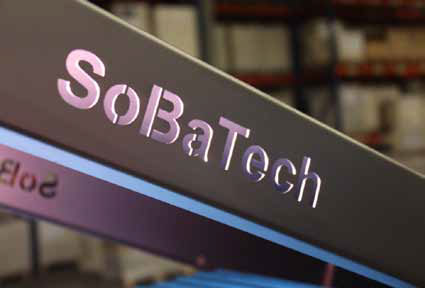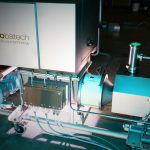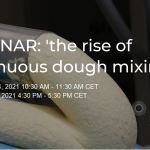Dutch machine builder passes on a massive 40% reduction in energy consumption compared to alternative systems.
Background
In 2010, Sobatech, successfully introduced the EasyMixer continuous mixing system. It took a decisive leap forward when it manufactured, installed and commissioned one of the world’s largest continuous dough mixing and kneading line for a large South African company. This project includes an embedded loss-in-weight (LIW) system, which represents a major technological achievement. Sobatech focuses primarily on meeting customer demands for high dough quality and consistency, in very large volumes. Gilian Lekner, CEO of Sobatech, explains: “The challenge industrial bakeries face is a consistent dough quality, regardless of who operates the line. Another aspect is energy consumption and the reduction thereof, a hot topic in the industry. Moreover, industrial bakers also want a solution to the desire for less salt in bread.”
Transparent dosing system
Sobatech co-operated with Rockwell Automation in The Netherlands to develop an Allen-Bradley ControlLogix PAC-based LIW application that offers huge advances in terms of functionality and openness in comparison to the regular controllers used for metering hoppers. “The big advantage for our customer is that it now has an open and transparent dosing system. This is much more attractive for the user compared to other solutions, which are based on proprietary ‘black boxes’,” explains Lekner. “It is impossible to make modifications to the software within a black box system, but because Rockwell Automation works with open-source software, we were able to collaborate on the development of an LIW application tailor-made for the type of ingredients we work with.”
Safety
Mixing equipment pose considerable safety risks. Due to the mass inertia, the machines do not stop immediately the moment they are switched off. With the Allen-Bradley MSR300 Safety Relays, the machine is equipped with fail-safe control of the motors. In the event of a shutdown, the machine stops in a controlled manner. The safety module sends a signal to the multiple Allen-Bradley PowerFlex 755 drives, and all mixing and kneading movements are stopped within a safe time span.
Collaboration with Rockwell Automation
When awarded the contract for the huge line in South Africa, Sobatech faced a great challenge. “To carry out this project, we worked very closely with Rockwell Automation,” Lekner says. “Our line produces the dough in a continuous flow rather than in batches. Herein lays the secret to the consistent quality a Sobatech continuous doing and continuous mixing system achieves, which is ideal for large-volume production. Furthermore, a Sobatech continuous mixer uses a massive 40% less energy than comparable equipment from our competitors. Besides the actual mixing and kneading of the dough, our line includes ingredient handling, dough preparation, dough processing and finally the baking and cooling.” The line was commissioned in March 2010. After extensive testing and performance measurement by the customer, it entered production immediately. “Our collaboration with Rockwell Automation was very open, close and productive,” states Lekner. “The entire control system
for the line is implemented using Rockwell Automation Allen-Bradley products, including ControlLogix programmable automation controllers (PACs), PanelView Plus HMIs, MSR300 Safety Relays,
switching equipment and multiple PowerFlex 755 drives.”
Result
“All this has resulted in the largest installation for the production of toast-bread in the world,” Lekner elaborates. “The new line processes eight tonnes of dough per hour; that is the equivalent of 160,000 hamburger buns each hour. Imagine the quantity of meat this represents, per hour! “The investment in the Sobatech continuous dosing and continuous mixing part of the line is 10% lower than for a batch-style equivalent. On top of this, it also realises enormous savings in power consumption because, among other advantages, our line does not require an ice machine for cooling.” Lekner continues “There is also less waste during production, due to the consistent quality of the dough. Another advantage of the new system is the ability to service it remotely. The daily cleaning has also become a much more simple operation – something that will be appreciated every day. This is due to the fully automated cleaning in place (CIP), which meets the highest hygiene standards in the bakery industry.”
Lekner concludes “Thanks to the excellent working relationship with Rockwell Automation, the pay-back time for this new continuous dosing, mixing and kneading system is less than two years – thanks to the reduction of waste, the savings on energy and raw material costs and the lower maintenance requirements”
Additional Information
The results mentioned above are specific to Sobatech continuous technology’s use of Rockwell Automation products and services in conjunction with other products. Specific results may vary for other customers.





